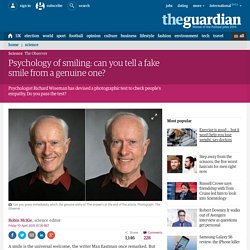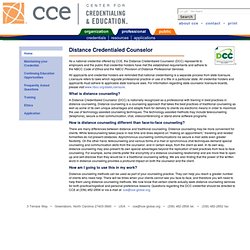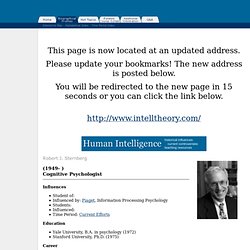

Psychology of smiling: can you tell a fake smile from a genuine one? A smile is the universal welcome, the writer Max Eastman once remarked.

But how sure can we be that a person’s smile is genuine? The answer is the empathy test, created by psychologist Richard Wiseman, which probes our ability to appreciate the feelings of others – from their appearance. A photographer asks a subject to imagine meeting an individual they don’t like and to put on a fake smile. Later the subject sits with a real friend and as they converse, the photographer records their genuine smile. Thus two versions of their smile are recorded. The question is: how easy is it to tell the difference? But how do professions differ in their ability to spot a fake? At the party, hosted by the Science Museum in London, some of Britain’s top researchers mingled with UK science journalists.
“The public normally gets around 60% right, which is above the chance level of 50%,” says Wiseman. As to the difference between the two photographs above, it is the one on the right that is false. Carl Jung and "Compensation" [Lexicon] Compensation: A natural process aimed at establishing or maintaining balance within the psyche.
![Carl Jung and "Compensation" [Lexicon]](http://cdn.pearltrees.com/s/pic/th/psychology-compensation-106463038)
The activity of consciousness is selective. Selection demands direction. But direction requires the exclusion of everything irrelevant. This is bound to make the conscious orientation one-sided. The repressed unconscious contents break through in the form of dreams and spontaneous images. . . . As a rule, the unconscious compensation does not run counter to consciousness, but is rather a balancing or supplementing of the conscious orientation. In dreams, for instance, the unconscious supplies all those contents that are constellated by the conscious situation but are inhibited by conscious selection, although a knowledge of them would be indispensable for complete adaptation["Definitions," CW 6, par. 694.] In neurosis, where consciousness is one-sided to an extreme, the aim of analytic therapy is the realization and assimilation of unconscious contents so that compensation may be reestablished.
36 Ways To Be Irresistibly Attractive. APA Division 47. Read About Psychology Degrees and Learn How You Can Get a Psychology Degree Online or Find the Right School for You, from All Psychology Schools. Homepage. National Center for Complementary and Alternative Medicine [NCCAM] - nccam.nih.gov Home Page. Distance Credentialed Counselor. As a national credential offered by CCE, the Distance Credentialed Counselor (DCC) represents to employers and the public that credential holders have met the established requirements and adhere to the NBCC Code of Ethics and the NBCC Provision of Distance Professional Services.

All applicants and credential holders are reminded that national credentialing is a separate process from state licensure. Licensure refers to laws which regulate professional practice or use of a title in a particular state. All credential holders and applicants must adhere to applicable state licensure laws. For information regarding state counselor licensure boards, please visit www.nbcc.org/stateLicensure. What is distance counseling? A Distance Credentialed Counselor (DCC) is nationally recognized as a professional with training in best practices in distance counseling. How is distance counseling different than face-to-face counseling? There are many differences between distance and traditional counseling. Find PDF Books: search over 250 million PDF documents (articles, manuals and books) A Free & Comprehensive Guide To The World of Psychology. Psychology - Complete Guide to Psychology for Students, Educators & Enthusiasts.
Psychology Fitness. Psychology Jokes and Sigmund Freud - Jokes and Science. Human Growth and Development. Human Intelligence: Robert J. Sternberg. This page is now located at an updated address.

Please update your bookmarks! The new address is posted below. You will be redirected to the new page in 15 seconds or you can click the link below. Robert J. Sternberg (1949- ) Cognitive Psychologist Influences Student of: Influenced by: Piaget, Information Processing Psychology Students: Influenced: Time Period: Current Efforts Education Yale University, B.A. in psychology (1972) Stanford University, Ph.D. (1975) Career Definition of Intelligence "I define [intelligence] as your skill in achieving whatever it is you want to attain in your life within your sociocultural context.by capitalizing on your strengths and compensating for, or correcting, your weaknesses ( personal communication, July 29, 2004).
" Major Contributions Triarchic Theory of Human Intelligence Several influential theories related to creativity, wisdom, thinking styles, love and hate Author of over 1000 books, book chapters and articles. Www.hofstra.edu/pdf/Community/slzctr/stdcsl/stdcsl_triangular.pdf. Www.whatkidscando.org/featurestories/2007/maine_students/tip_sheets/INTERVIEWING TIP SHEET.pdf. Integrative problem-centered therapy ...